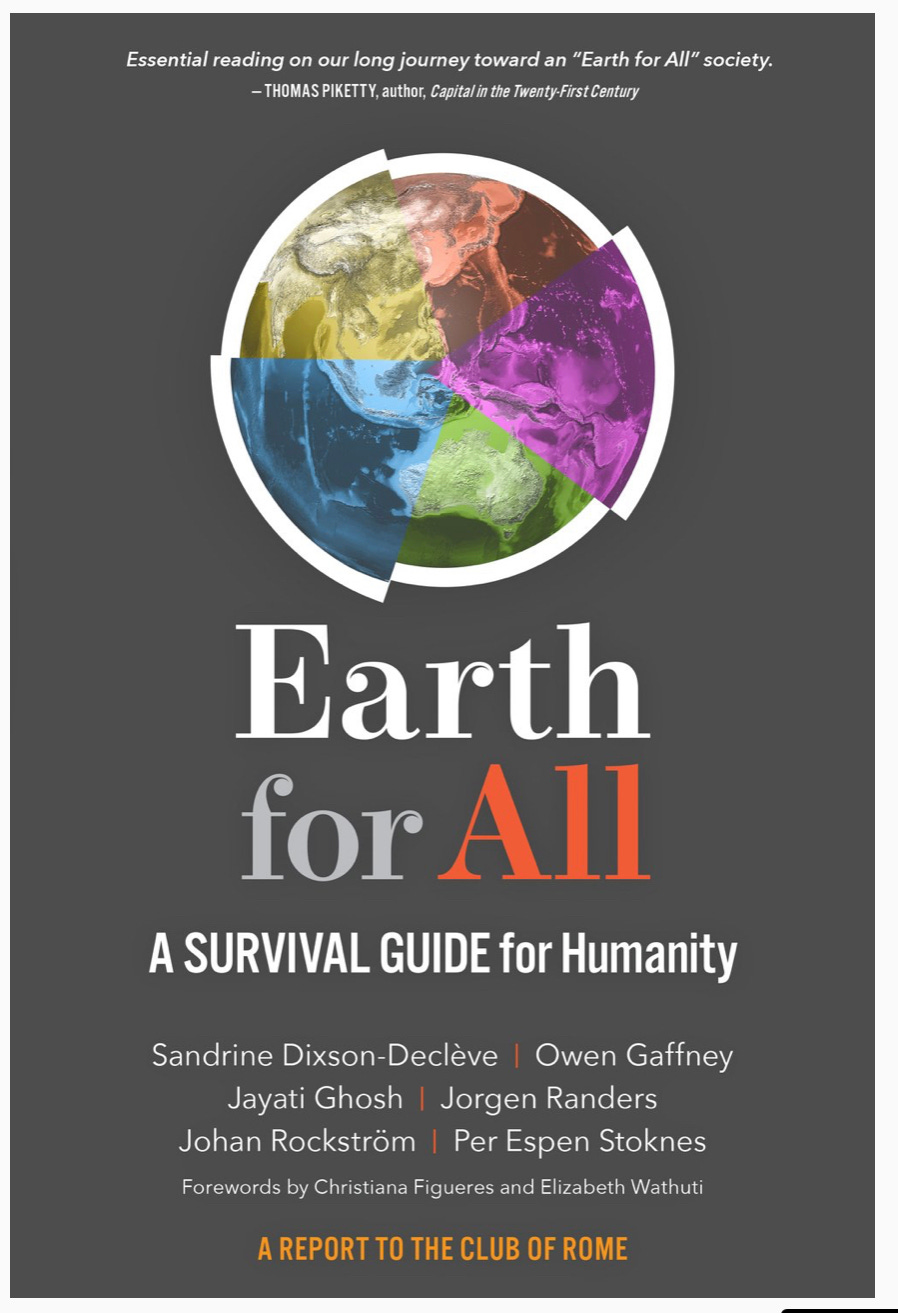Welcome to Just Two Things, which I try to publish three days a week. Some links may also appear on my blog from time to time. Links to the main articles are in cross-heads as well as the story. A reminder that if you don’t see Just Two Things in your inbox, it might have been routed to your spam filter. Comments are open.
1: COP27 and the eve of destruction
There’s a punchy editorial about COP27 and climate change at the South African paper Daily Maverick by the paper’s editor, Branko Brkic. It starts with the words, ”We have failed”, and then gets into a conversation with itself about starting like that:
I was urged NOT to start with this sentence. To be positive. There is still time. There’s still a chance. This can still be solved.
He’s not completely fatalist about this, as it turns out. But he does say that if we are going to solve it, we need to be honest with ourselves about a couple of things first:
We’re already deep in the calamity that may end civilisation as we know it.
The great majority of humanity either doesn’t know that, or, even worse, doesn’t care – sometimes viciously.
But when he says, “We have failed”, which he repeats a few lines further down, he means pretty much the entire planetary elite and all of our dominant systems of knowledge.
We have failed
as the media, as a politically aware class, as the business elite, as the leaders, as the religions’ holy people, as their followers.
And come to that:
Our spiritual frameworks, our philosophies, our education institutions tried their best but failed to make us act and now prepare us for the incoming disaster. We are, individually and collectively, responsible for the greatest heating of the Earth’s atmosphere since the Permian Extinction, about 250 million years ago.
Anyway, it’s trenchant, and probably doesn’t say anything that most readers of Just Don’t Things don’t know. He could have probably been angrier; there are plenty of business leaders who have been completely complicit in this even while they have been making super-profits and lobbying governments to do as little as possible.
But it does make a change just to read someone who is as angry as we should be about the cataclysmic failure represented by climate change.
He’s sympathetic to the climate activists who have tried to do something about the issue. But they have also failed to move the dial:
Very vocal climate activists have brought many issues to the fore – and forcefully so. But, in a way, they have also failed: most people switch off when faced with single-issue activism in a complex, complicated world that makes daily survival so onerous to so many.
And he doesn’t let his own newspaper off the hook: it takes climate change seriously, but it’s had no effect:
We can publish thousands of articles, and we at Daily Maverick’s Our Burning Planet, and many other media teams, have done exactly that. We can produce documentaries and movies. We can televise debates and debate on television. We can picket at political summits. We can glue ourselves to walls at business conferences. We can chase oil tankers and make human chains around fossil-fuel power stations.
The truth is, none of it has worked so far.
The challenge he’s throwing at us is how to create both a sense of urgency we need—and cut through all of this noise.
We need an act of imagination that will change the discussion.
We need a super-butterfly to flap its wings and take us in another direction.
We need a message that will not be forgotten or forsaken.
We need a few minutes of forceful truth that will bring the truth in all its horror, but also leave us feeling energetic and empowered to do something.
I’m not quite sure about his solution, but since we have done so badly so far we probably should try everything. The Daily Maverick has re-versioned Barry McGuire’s 1960s hit “The Eve of Destruction” as a climate change anthem, sung by Anneli Kamfer.
They want to try to make sure it’s heard everywhere. They hope it becomes an anthem. It’s a strong video, and she has a strong voice. I’m happy to do my bit to help.
2: Five (big) steps to a fair and sustainable world
I’ve written about Limits to Growth here, and elsewhere, over the years. But a piece on the Naked Capitalism blog this week reminded me that the Club of Rome, which published Limits to Growth in 1972 has marked its 50th anniversary with a sequel, Earth4All. It’s published as a book, but the website has a good summary.
It argues that we can save ourselves from the worst of where the species is heading by “upgrading the economic system”. (I have to say that I liked the idea of an upgrade, which reminded me about George Lakoff’s work on the political importance of seizing control of your metaphors if you want to make change.)
There are five programmes here—what they call, with admirable honesty, “five extraordinary turnarounds”—each with three policies attached. I’m going to mention all five, though may not have much time for the policy detail.
1. Eliminate poverty.
The poverty turnaround focuses on the solutions to raise the national average income to USD$15,000 per year. At this level, if inequality is restrained, the majority of people can enjoy higher wellbeing, greater economic security and more economic opportunities. This will require rapid economic growth at a time when growth is slowing or even stagnating in the poorest countries.
The policy levers here include a new tranche of IMF Special Drawing Rights that fund green, jobs-creating investments in poorer countries, and debt cancellation by the rich world to countries with per capita incomes of less than $10,000 per head.
2. Reduce inequality
The goal here is that the top 10% in any country take less than 40% of national incomes — in many countries this is currently over 50%. Although these proposals are usually decried by conservatives as “the politics of envy”, the data suggests that lower inequality levels are associated with better social outcomes:
New data has allowed us to see an unambiguous pattern related to inequality over recent decades: countries with greater equality perform better in all areas of human wellbeing and achievement.
I’d like to see a bit more on this—it might still be correlation and not causation, though I’d like to believe it’s causal. The policy measures here include around taxing the richest 10% more heavily, and strengthening workers’ rights as a way of increasing their share of national income. They also recommend the introduction of citizen’s wealth schemes or social dividends.
3. Empower women
This is something of a public good, but it also, again tends to correlate with better social and economic outcomes.
Massive investment in education for girls and delivering economic security for women are both critically important for a good life within planetary boundaries. This is how we create fair and just societies... There is an important additional benefit. As women have more control over their future, they choose to have fewer children.
The policy measures here are simplest: girls’ education and gender equality in work, plus a pensions upgrade for women.
4. Transform food systems
I wrote a long piece about this here on Monday, but obviously it’s necessary. Here’s what they say:
The way we farm, transport and consume food affects more planetary boundaries than anything else. Agriculture is one of the biggest sources of greenhouse gas emissions. It is also the biggest driver of deforestation, biodiversity loss and the creation of vast dead zones in our streams, lakes and oceans. Agriculture is not working for people either, with 9% of our global population severely food insecure at one extreme 8% of deaths globally attributable to obesity at the other.
The food “market” isn’t really functioning any more, in that it can only work by exporting its external costs to everyone else, in terms of poor health outcomes and poor environmental outcomes. This is true everywhere, not just in the global South.
5. The energy turnaround
Within a generation most countries could achieve energy security for the first time. This brings with it many more benefits from clean air and better health to zero fossil-fuel emissions... Solutions to halve emissions in a decade are available, affordable and ready to scale rapidly. Crucially, we have reached the critical inflection point where prices of renewables are comparable or cheaper than fossil fuels. Exciting new solutions now exist in sectors that were once considered hard to decarbonise, such as long-distance trucking, shipping, or cement and steel manufacturing. Urgent action is needed to implement these solutions.
The policy measures here include eliminating fossil fuel systems (stopping subsidies would be a good start); ‘electrify everything; and significantly increasing the level of investment into electrification and energy efficiency.
The Commission is agnostic on growth. Instead it suggests a set of better questions for policy markers, about resilience, wellbeing, and sustainability:
(P)olitical leaders should instead ask: is the economy optimised for resilience? Is it improving the lives of the majority? Is it perceived as reasonably fair? Does it protect our planet and the wellbeing of future generations? Does it help deliver the prime goal of a state - to keep citizens safe and secure over the long term? Are we measuring and valuing the right things?
There’s a whole bunch of background material on the site. More here on the people who made up the The 21st Century Transformational Economics Commission. There’s an executive summary of the argument—this is the English one, but other languages are available. There are also background videos and background briefing papers.
j2t#391
If you are enjoying Just Two Things, please do send it on to a friend or colleague.



